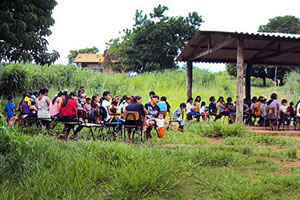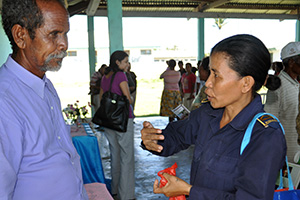Women in power and decision-making
Women are often subjected to violence, or threats of violence, when they exercise their political rights or when they are actively engaged in politics. Studies show that female voters are four times as likely as men to be targeted for intimidation in elections in fragile and transitional States. Moreover, a 2014 study by the Centre for Social Research and UN Women revealed that more than 60 per cent of women in parts of South Asia do not participate in politics due to fear of violence; and 45 per cent of women candidates in India faced physical violence and threats.
Violence and sexual harassment also affect women’s ability to take full part in other spheres of power and decision-making, be it in banks, corporate boardrooms, mass media, academic and scientific institutions, and regional and international organizations.
To address such challenges, UN Women works with women leaders and decision-makers in politics, the police and the private-sector, among other areas, to help raise awareness and respond to gender-based violence. We conduct research on violence in politics and advocate for solutions. Through our Fund for Gender Equality, we work with women’s grass-roots groups to help give them a greater voice on a range of issues. We also empower and train political candidates to address women’s issues, including violence.
Indigenous women’s assemblies tackling cases of violence and rights violations
In Brazil and Paraguay, Project Cuña, supported by UN Women and two local NGOs, is empowering indigenous women to take action against human rights violations in their communities, such as human trafficking and the exploitation of indigenous lands by agri-businesses. Using data collection skills learned in workshops, women in the community have been able to investigate 140 cases of rights violations in the communities over a two-year period, many related to domestic violence, sexual abuse and trafficking.
In Timor-Leste communities mobilize to confront domestic violence
In the village of Maudemo, Timor-Leste, where close proximity to the Indonesian border makes the area prone to conflict, and where women face high rates of sexual and gender-based violence, UN Women is supporting male and female peace agents and police to raise awareness of rights and laws. Through a network, composed of 35 organizations, self-help groups also offer survivors emotional and legal support, as well as employment and literacy skills to get women back on their feet.
What the Beijing Declaration says about Women in power and decision-making
Read our Beijing+20 In Focus package on Women in power and decision-making
Go back to UN Women's In Focus compilation on Ending Violence against Women 2014

